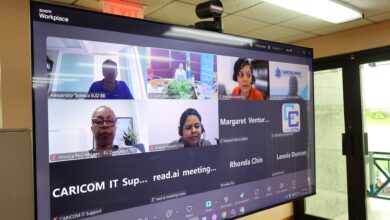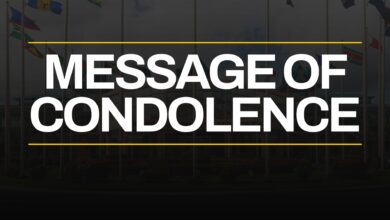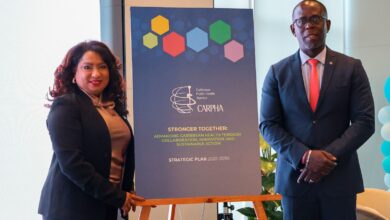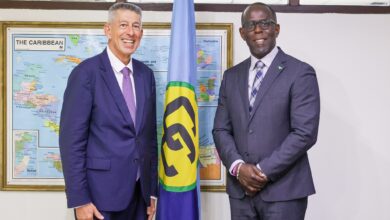Hon. Bruce Golding, Prime Minister of Jamaica
Hon. Portia Simpson Miller, Leader of the Opposition
Hon. Baldwin Spencer, Prime Minister and Minister of Foreign Affairs of Antigua and Barbuda, and Outgoing Chair of the Council for Foreign and Community Relations
Fellow Members of the Cabinet
Honourable President and Members of the Senate Colleague
Ministers of Foreign Affairs of CARICOM Member States
His Excellency Edwin Carrington, Secretary-General of CARICOM
His Excellency Thomas Shannon, US Assistant Secretary of State for Western Hemisphere Affairs
Members of the Diplomatic Corps
Heads of International Organizations
Dean of the Consular Corps and Consular Representatives of CARICOM countries
Members of the Private Sector
Representatives of the Media
Distinguished Ladies and Gentlemen,
It is indeed an honour, as host and Chairman, to welcome you to the Opening Ceremony of the Twelfth Meeting of the CARICOM Council for Foreign and Community Relations. I am pleased that so many of you have travelled to Jamaica to participate in the discussions on the way forward for the Community, and am very encouraged by the high level of representation.
Ladies and Gentlemen, we are meeting at a crucial juncture in the life of the Caribbean Community and in an international environment that is proving to be increasingly hostile, not only to developing countries, but also developed countries. Many countries are now faced with what has been deemed the worst global and economic crisis since the 1930’s, the full effects of which are still undetermined. Undoubtedly, some countries have been better able to cope with the crisis than others.
The Region, however, has already begun to feel the effects of the crisis through reduced remittances, the divergence of critical developmental and concessional funding, the postponement of investment projects, rising unemployment and the collapse of a number of financial institutions. What is apparent is that this crisis presents us with new challenges that threaten to derail the advancements made by the Community in a number of critical areas.
At the same time, the Region must work to overcome a number of other challenges, which include climate change and disaster mitigation, food security, energy diversification, regional security, and the provision of adequate healthcare. The increasing frequency of tropical storms and the accompanying devastation, particularly in Cuba and Haiti, reaffirm the need for concerted action in addressing the issue of climate change. We note, with concern also, the threat of H1N1 Flu in our Region, and are encouraged that CARICOM Member States have put in place measures to mitigate the threat and protect our peoples.
These challenges, new and old combined, have the potential to increase our vulnerability to exogenous shocks, and may have significant implications for the viability and sustainability of the countries of the Region. However, the challenges are not insurmountable, if tackled in a carefully coordinated and strategic way by the Community. It is against this background, Ladies and Gentlemen, that we undertake to develop new and strengthen existing policies that will best serve the interests of the Community.
COFCOR is tasked with the critical responsibility of ensuring the effective, strategic, and well-devised coordination of the Community’s foreign policy. Our meeting is, therefore, timely as it comes on the heels of several major meetings that were convened to address issues affecting not only the Region, but the world as a whole. These include the G20 Summit held in London on the 2nd April 2009, and the Fifth Summit of the Region. I wish to congratulate most warmly the Government and People of Trinidad and Tobago for the excellent arrangements made for the Summit, and for creating a climate of warmth and typical Caribbean hospitality that helped to ensure the success of the highest diplomatic forum in our hemisphere. I believe that the hosting of this meeting in a CARICOM country has raised the profile of our region in the hemisphere and generated tremendous goodwill towards the countries and peoples of our Caribbean Community.
Ladies and gentlemen, it is worth recalling that at the Twentieth Inter-Sessional Meeting of the Conference of Heads of Government in Belize earlier this year, our Heads issued a Statement on the Global Economic and Financial Crisis and the Impact on, and Policy Implications for the Caribbean Region, outlining the concerns of the Region ahead of the G20 London Summit. This coordinated approach proved to be quite effective, and must be continued and supported as the region undertakes to mitigate the effects of any potential threat to its stability and growth. It is, therefore, up to us as Foreign Ministers to assist in the nurturing of this process, so that the best possible outcomes can be secured.
As such, we, colleague Ministers, will need to closely monitor the developments in the global arena, and take the required actions and make the necessary recommendations to protect our interests. This will require our combined efforts as well as greater information sharing among our Ministries and the CARICOM Secretariat. I also look forward to a revitalized role for the Bureau of COFCOR, as a standing body that is flexible and agile, and able to address any issues or concerns that might require the urgent and ongoing attention of CARICOM Foreign Ministers.
The year past proved to be a highly active one for the Community. The Community participated in the Fifth Summit of the European Union and Latin America and the Caribbean; the Conference on the Caribbean; the CARICOM-Spain Summit; the Caribbean-UK Ministerial Forum; and a high level meeting with Turkey, to name a few. In addition, the Community was among the participants at the first Summit of Latin America and Caribbean Heads of State and Government, held in Brazil in December, which sought to strengthen regional integration and establish commitments for joint action to promote sustainable development.
Our engagement with Latin America must be seen as part of the region’s push to expand our own political and economic space, as we seek new partners for development and growth. We have actively engaged countries in our own neighbourhood and other regions, and have secured, we believe, reliable partners in our quest for the advancement of our peoples. In this regard, we look forward to the meeting of Foreign Ministers of Latin America and the Caribbean to be held later this year in Jamaica, as a follow-up to the Bahia Summit on Integration and Development.
Notwithstanding these fruitful diplomatic encounters, we must remain vigilant and engaged, as the work has only just begun. Emanating from these meetings are decisions on matters that we here in the Caribbean must remain abreast of and undertake the requisite follow-up to ensure their successful implementation, if we are to profit at all. Colleague Ministers, we must exercise effective ownership of our agreed upon development policies. This may require us to meet more frequently, communicate more regularly, debate more passionately and act more decisively through COFCOR and the COFCOR Bureau, especially in the light of the rapidly changing and constantly evolving geo-political environment in which we operate.
The theme chosen for this year’s Ministerial Retreat, “Advancing Regional Integration and Development: A Response to Global Challenges” encompasses the dynamism of the processes underway within CARICOM. It is hoped that the meeting will facilitate the recommendation of sound policies that will allow the region to expand the political and economic space in which we operate, and take advantage of previously untapped potentials, particularly in Latin America.
Ladies and gentlemen, as I assume the Chairmanship of COFCOR, it is my sincere hope that the deliberations over the next two days are not only enjoyable, but also focused and results-oriented.
Thank you and a very warm welcome once again to Jamaica





